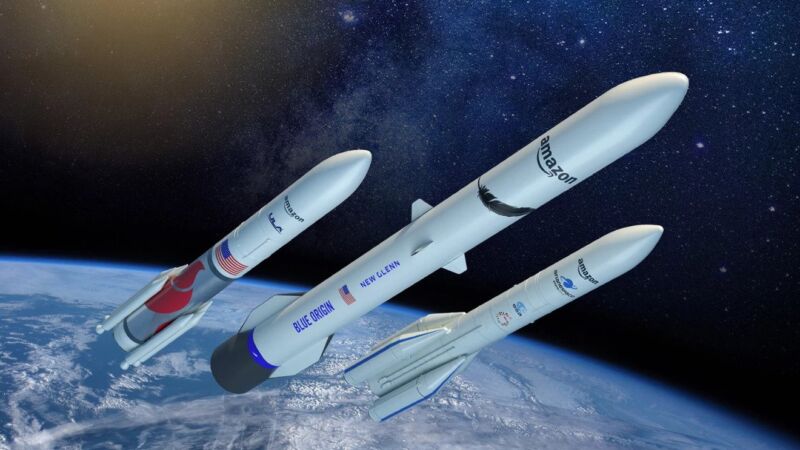FCC approves Amazon’s satellite broadband plan over SpaceX’s objections

Amazon’s Kuiper division can start launching satellites to offer broadband service in the US, the Federal Communications Commission said yesterday.
The FCC’s International Bureau approved Kuiper’s orbital debris mitigation plan. This approval was needed to satisfy a condition imposed in 2020 when the Amazon subsidiary received tentative approval for a network of 3,236 satellites in low-Earth orbit.
“Our action will allow Kuiper to begin deployment of its constellation in order to bring high-speed broadband connectivity to customers around the world,” yesterday’s FCC order said.
Amazon’s satellite launch plans took shape in April 2022 when it announced deals for 83 launches over five years using Arianespace, Blue Origin, and United Launch Alliance. Amazon said the deals would let it deploy most of its 3,236 planned satellites. The company plans to deploy two prototype satellites early in 2023 on the upcoming launch of United Launch Alliance’s new Vulcan Centaur rocket.
When contacted by Ars, Amazon declined to say when it will start launching the production satellites that will allow it to offer broadband service to homes and businesses. In a statement on the FCC decision, Amazon said, “Our orbital debris mitigation plans demonstrate the Kuiper System is designed to meet or exceed all requirements set forth by the FCC. We are pleased that the Commission has granted our application and we appreciate the coordination to ensure the industry is prioritizing safety.”
The FCC said it found “Kuiper’s orbital debris mitigation plan to be sufficiently developed to support deployment of its NGSO [non-geostationary orbit] satellite system.”
SpaceX sought 578-satellite limit
Amazon’s biggest competitor for low-latency satellite broadband will be SpaceX’s Starlink service, but Amazon’s launch schedule puts it a few years behind SpaceX. The companies have fought each other in FCC proceedings, with Amazon objecting to SpaceX’s satellite plans and SpaceX filing objections to Amazon’s.
In approving Amazon’s plan yesterday, the FCC dismissed objections from other satellite providers such as SpaceX and Viasat. As the FCC order notes, SpaceX argued that the commission “should limit Kuiper to deploy only 578 satellites in its 630 kilometer orbital shell, and defer action regarding the remainder of the constellation,” in order to “address Kuiper’s ability to coexist with other systems in and around its 590 kilometer and 610 kilometer shells, and allow for ‘continued monitoring’ of deployment.”
A Space filing last month said, “Granting an initial 578 satellites of Amazon’s 3,236-satellite system would offer Amazon a path to begin deploying for ‘many months,’ while providing the Commission with time and additional data to assess the serious issues raised in this proceeding.”
The FCC concluded that SpaceX’s requested limit isn’t necessary:
To the extent that SpaceX is concerned with Kuiper demonstrating its ability to safely operate, the conditions adopted here are designed to address that point. We do not see a specific need to further limit Kuiper’s authorization. While SpaceX expresses concern over Kuiper’s ability to co-exist with other systems at certain altitudes, similar to Viasat, it does not specify a particular risk presented by the deployment of an identified planned system.
The FCC order said in a footnote, “In terms of numbers of satellites, we observe that SpaceX’s proposed second generation Starlink constellation, which has been authorized in part, is almost ten times as large as Kuiper’s planned system.” The FCC also said the requirements it imposed on the Kuiper and SpaceX constellations are similar.
FCC dismisses other objections
According to the FCC, SpaceX also argued “that Kuiper’s satellite disposal strategy will place the Kuiper satellites in an elliptical orbit that, because of the variable effects of atmospheric drag on orbit evolution, will result in large uncertainties in the predicted trajectories of the Kuiper satellites, making it difficult for other operators to assess and mitigate risk.” SpaceX contended that “the large covariances involved in the elliptical orbits may therefore pose a risk to SpaceX’s satellites operating at the same altitudes during their orbit raising phase of operations.”
However, Kuiper responded that it “will perform orbit determination using Global Positioning System (GPS) measurements on all Kuiper satellites during the deorbiting process and share high-accuracy location information with operators on a real-time basis.” The FCC accepted that plan and imposed it as a condition on the license.
SpaceX and Viasat both “raised concerns that Kuiper’s satellite designs are not sufficiently finalized to enable review,” but Amazon said the design is complete and that it doesn’t expect material changes, the FCC order said. Kuiper would have to apply for a license modification if it does make significant changes.
Starlink speeds have been dropping as it signs up more users, but it’s still a viable option for people without access to cable or fiber. SpaceX President and COO Gwynne Shotwell said yesterday that Starlink had its first “cash-flow positive quarter last year” and that the satellite division “will make money” in 2023, according to CNBC. For residential users, Starlink costs $110 a month plus a one-time hardware cost of $599.
https://arstechnica.com/?p=1916496